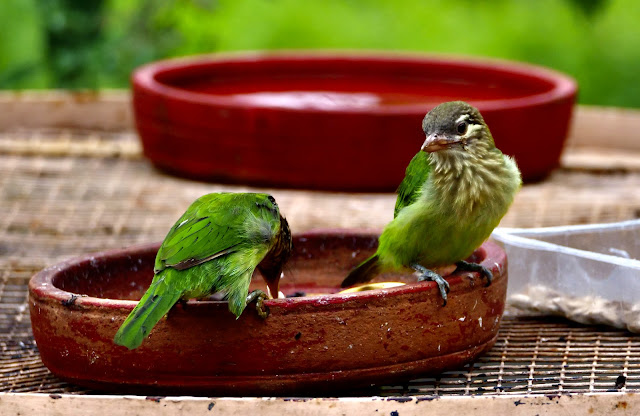Then came the surprise! The Juvenile Bird flew away to be perched in the tree.
The three patterns I noticed in this transition of feeding education of a Juvenile Barbet by its parent were:
The parent bird offering the food.
The Juvenile bird taking the food.
The Juvenile bird in the early stage of self-feeding.
The food was offered and the juvenile bird actively reached out to the bills of the parent bird to take the food. The juvenile bird was not fed by offering the food into its open mouth. The Juvenile Barbet had to take the food unlike receiving passively in the open mouth.
That stage was already over, as the juvenile bird crossed the fledgling phase of its growth.
I wonder whether it points to three possibilities for human parents to consider, while being involved with their infant who is growing to be a toddler!
An Infant receives.
A toddler finds.
A pre-schooler chooses.
I wonder whether parents get used to the quick transitions in the life of their child who is growing up !
When I see a parent or care giver chasing a toddler or a pre-schooler to feed by going after the child or feeding a child while making the child watch the TV screen or the mobile, I suspect that parents miss behaving corresponding to the transitions of a child in the first three years!
I also suspect that parents wanting to make their task easier, resort to do for a toddler or a pre-schooler many self help steps, which a child is able to do, but prevented to do by parents taking over to do for them. That indicates that the parenting practices do not change corresponding to the independence parents are required to offer to children for their children to continue the natural transition in growth and development!
For parents to grow up. they need to affirm the transitions taking place in a toddler, pre-schooler or early school going child !
I wonder while, we monitor the growth and development of infants, toddlers and pre-school children in a systematic manner, whether we monitor the growing up skills of parents in their parenting practices!
The children grow and develop from infancy!
How much parents grow up correspondingly to adapt the parenting practices to correspond with the changing cognitive, emotional and social needs of growing up children!
I wonder whether we educate parents enough on the science, art and aptitude in parenting skills!
I wish parenting practices become a serious conversation topic between parents!
M.C.Mathew (text and photo)


















No comments:
Post a Comment